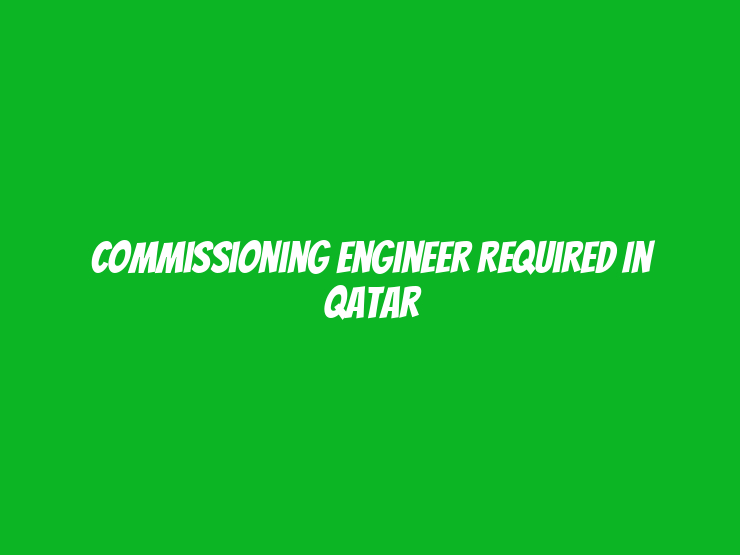A Commissioning Engineer is a highly skilled professional responsible for overseeing and managing the commissioning process of industrial systems, equipment, and infrastructure projects. They play a crucial role in ensuring that all components of a project, from individual pieces of equipment to entire systems, function correctly and efficiently before they are handed over for operational use. This role requires a strong technical background, problem-solving abilities, and excellent communication skills. Commissioning Engineers work across various industries, including oil & gas, power generation, manufacturing, and construction, to verify that systems meet the design specifications and safety requirements.
Dua for Job Seeking: اللهم يسر ولا تعسر واكمل ولا تكل وبارك لي فيما قَدَّرت
| Salary | Market Competitive |
| Experience | 2 years |
| Location | Qatar |
| Qualification | Bachelor Degree |
| Posted | 11 November 2024 |
| Job Type | Full-Time |
| Posted by | Habeebi Recruiter |
| last date to apply | apply within 15 days of posting |
Key Responsibilities
1. Planning and Preparation
The Commissioning Engineer begins by reviewing project plans, specifications, and drawings to gain a thorough understanding of the systems to be commissioned. They collaborate with project managers, designers, and other stakeholders to develop a detailed commissioning plan, which outlines the procedures, tests, and protocols needed to ensure a smooth process. This stage involves assessing potential risks, defining test strategies, and coordinating with suppliers and subcontractors to arrange necessary resources and equipment.
2. System Testing and Verification
One of the core responsibilities of a Commissioning Engineer is to conduct various tests and checks on individual components and integrated systems. This involves performing pre-commissioning activities such as inspections, calibration, and initial equipment testing. They ensure that all systems are installed correctly, comply with industry standards, and operate as intended. The engineer also verifies that control systems, automation, and instrumentation are fully functional, identifying any issues or discrepancies and troubleshooting them effectively.
3. Performance Evaluation and Troubleshooting
During the commissioning phase, the engineer evaluates the performance of the systems to confirm they meet the specified design criteria and performance benchmarks. If any issues arise, the Commissioning Engineer conducts detailed diagnostics, analyzes data, and works to resolve any problems promptly. This may involve adjusting system parameters, reconfiguring control settings, or coordinating with maintenance teams and equipment vendors to rectify faults and optimize performance.
4. Documentation and Reporting
A critical aspect of the commissioning process is comprehensive documentation. The Commissioning Engineer is responsible for maintaining detailed records of all tests conducted, including test results, calibration data, and any adjustments made. They prepare detailed commissioning reports that summarize the procedures followed, results obtained, and any issues encountered, providing a clear trail of evidence for regulatory compliance and future reference. This documentation is essential for the handover phase and forms the basis for ongoing operational support.
5. Training and Handover
Once the systems have been successfully tested and verified, the Commissioning Engineer facilitates the handover process to the operational team. This includes conducting training sessions to familiarize the operators and maintenance staff with the new systems, providing guidance on operation, maintenance, and troubleshooting. The engineer ensures that the end-users have a comprehensive understanding of the equipment, its functionalities, and safety protocols before it becomes fully operational.
6. Continuous Improvement and Safety Compliance
Commissioning Engineers play a key role in identifying opportunities for process optimization and efficiency improvements. They provide feedback and recommendations based on their commissioning experience, contributing to design enhancements and best practices for future projects. Additionally, they ensure that all activities adhere to health, safety, and environmental regulations, minimizing risks and ensuring safe operational handover.
Qualifications and Skills
- Educational Background: A bachelor’s degree in engineering (e.g., mechanical, electrical, or chemical engineering) or a related field.
- Technical Expertise: Strong knowledge of industrial systems, automation, control systems, and project management.
- Problem-Solving Skills: Ability to diagnose and resolve complex technical issues.
- Communication Skills: Excellent verbal and written communication for effective collaboration with stakeholders.
- Attention to Detail: High level of precision in testing, verification, and documentation processes.
Career Prospects
The role of a Commissioning Engineer offers dynamic career opportunities across various industries, including oil & gas, energy, pharmaceuticals, and manufacturing. With experience, engineers can advance to senior roles, such as Lead Commissioning Engineer or Project Manager, and can also transition into consulting, quality assurance, or operations management. The role is well-suited for professionals who enjoy problem-solving, technical challenges, and working in a hands-on environment.
This comprehensive job description highlights the responsibilities and expectations of a Commissioning Engineer, making it an essential reference for employers seeking qualified candidates and professionals looking to understand the scope of the role.
How to apply:
Send your updated resume to our email:
Email: hr4@madre-me.com
Disclaimer:
- We list jobs submitted by employers. HabeebiRecruiter.com does not verify employers or guarantee job details.
- Be aware: legitimate jobs never require upfront payment
